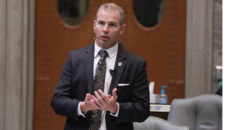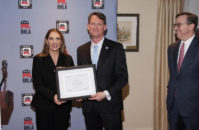Jefferson City, Mo. — The Attorney General’s Office sent 300 untested sexual assault kits out to be tested Thursday, it said in a release.
The Attorney General’s announcement continues the endeavor to test backlogged kits, a process that has been in the works since Josh Hawley, now a U.S. Senator, held the office back in 2018. Attorney General Eric Schmitt, now the Republican nominee for U.S. Senate, has said he is committed to clearing the backlog.
So far the inventory of the office is fully tested 3,643 SAFE kits, 1,408 untested and reported kits, 656 untested and unreported kits, and 6,234 partially tested kits.
Initially, the Attorney General’s Office received grant money from the Bureau of Justice Assistance, part of the Department of Justice that specializes in helping local law enforcement.
An informal survey done in 2018 found a large amount of untested rape kits were backlogged in the system in many parts of the state. Some of the kits dated back decades.
In order to receive the funding, a formal audit was done which only confirmed the problem at hand. The audit found more than 6,000 untested rape kits across Missouri.
After years of working through the backlog, the Attorney General’s Office received more grant money in 2020. This money would be used to specifically inventory and test kits from April 2018 to April 2020.
This second inventory round indexed 12,182 “in scope” kits from 599 law enforcement agencies and 126 health care providers.
Now, the office is using unspent funds from the grant as well as money allocated by the legislature to send and test kits.
For the past four years, the office has been utilizing private testing facilities to work through the backlog. By using private facilities the state is able to keep the few testing facilities in Missouri open to test new kits.
There is no backlog of current kits, and all law enforcement agencies across the state are testing rape kits at a normal rate, the Attorney General’s Office said. More than 82% of law enforcement agencies in the state report no rape kit backlog.
“The Office has already tested 3,478 kits. Roughly 70% of all untested, reported kits identified in the first and second inventories have been shipped and tested,” the Attorney General’s office said in a statement.
But there is more to this initiative than just testing the kits.
The DNA in the kits is uploaded to the Combined DNA Index System (CODIS). Here, the offender’s DNA is compared to an existing database of known offenders. Kits tested here in Missouri could lead to arrests all over the state and country.
Even when investigated shortly after the crime, sexual assaults are very difficult to prosecute. According to RAINN, a non-profit and the largest anti-sexual assault organization in the U.S., out of every 1,000 sexual assaults, 975 perpretrators will walk free.
Only 310 out of 1,000 are reported to police, only 50 reports will lead to an arrest. Just 28 cases will lead to a felony conviction, and only 25 will be incarcerated.
With such a low report and conviction rate, a large gap in time does not make it any easier for a victim to find justice.
But justice has begun, for at least one case in Missouri.
In 2021, a Boone County man was charged on counts of forcible rape, a crime he was linked to thanks to the testing of backlogged kits. The man plead guilty in May and was sentenced to seven years. He was already serving 75 years for similar sex crimes.
“Waiting almost 12 years for justice has been hard, but I am so thankful this day has finally come,” the victim, who chose to remain anonymous, told ABC 17. “To other survivors out there still waiting for their justice, I pray that this gives you hope that one day you will finally see justice as well.”
Four other cases are in process, based on hits from the tested kits. It is predicted that more are to come.
The Attorney General’s Office is lending its legal team to help prosecute any hits in counties that may be short-staffed or need a more experienced prosecution team.
Attorney General Eric Schmitt (PROVIDED/ATTORNEY GENERAL’S OFFICE)
Kelton is a 2023 graduate of the University of Missouri with a Bachelor of Arts in Political Science and a Bachelor of Arts in Religious Studies. He is a native of mid-Missouri and likes to write politics at both the state and federal levels. Kelton joined the Missouri Times in April 2022






















